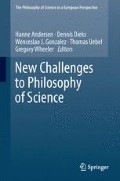Abstract
This article reflects on the scope and limits of mathematical methods in philosophy.
This article is based on my inaugural lecture, which I gave in Bristol in December 2010. Thanks to Richard Pettigrew, Hannes Leitgeb, Neil Coleman, and Gregory Wheeler for valuable comments on earlier drafts of this article, and for stimulating conversations on the subject. Research for this article was partially supported by the AHRC project “Foundations of Structuralism” (AH/H001670/1).
Access this chapter
Tax calculation will be finalised at checkout
Purchases are for personal use only
Notes
- 1.
An alternative for the nominalist is to develop a fictionalist position concerning mathematical objects. (Thanks to Neil Coleman for pointing that out.) But here I assume that indispensability arguments justify adopting a realist line on the question of the existence of mathematical objects.
- 2.
My former colleague Hannes Leitgeb emphasises that this is a valid objective of mathematical philosophy.
- 3.
This point is emphasized in (Hansson 2000).
- 4.
There is also the question who is meant with ‘our’ in this sentence. Experimental philosophers hold that many of the ‘intuitions’ on which analytical philosophy is built are generated by a quite unrepresentative sample of the population, and therefore suspect. I will leave this discussion aside here.
- 5.
Frege also made this point (Frege 1879, introduction).
References
Boltzmann, L., 1902, Model. Entry in the Encyclopedia Brittanica.
Carnap, R., 1928, Der logische Aufbau der Welt. Felix Meiner Verlag.
Carnap, R., 1950, The Logical Foundations of Probability. University of Chicago Press.
Church, A., 1951, “The Need for Abstract Entities in Semantical Analysis”, in: American Academy of Arts and Sciences Proceedings 81, pp. 110-133.
De Clercq, R., and Horsten, L., 2005, “Closer”, in: Synthese 146, pp. 371-393.
Earman, J., 1992, Bayes or Bust? Cambridge (Mass.): The MIT Press.
Frege, G., 1879, Begriffsschrift. Eine der arithmetischen nachgebildete Formelsprache des reinen Denkens. Louis Nebert.
Hansson, S., 2000, “Formalization in Philosophy”, in: Bulletin of Symbolic Logic 2, pp. 162-175.
Horsten, L., and Douven, I., 2008, “Formal Methods in the Philosophy of Science”, in: Studia Logica 89, pp. 151-162.
Horsten, L. and Pettigrew, R., 2011, “Mathematical Methods in Philosophy”, in: L. Horsten and R. Pettigrew (Eds.), Continuum Companion to Philosophical Logic. Continuum Press, pp. 14-26.
Joyce, J., 1998, “A Nonpragmatic Vindication of Probabilism”, in: Philosophy of Science 65, pp. 575-603.
Leitgeb, H., 2007, “A New Analysis of Quasi-analysis”, in: Journal of Philosophical Logic 36, pp. 181-226.
Leitgeb, H., “Logic in General Philosophy of Science: Old Things and New Things”, in: Synthese, to appear.
Leitgeb, H., A Probabilistic Semantics for Counterfactuals. Unpublished manuscript, 2010.
Müller, T., 2010, “Formal Methods in the Philosophy of Natural Science”, in: F. Stadler (Ed.), The Present Situation in the Philosophy of Science. Springer.
Niebergall, K.-G., 2011, “Mereology”, in: L. Horsten and R. Pettigrew (Eds.), Continuum Companion to Philosophical Logic. Continuum Press.
Rota, J.-C., 1988, “The Pernicious Influence of Mathematics upon Philosophy”, in: Synthese 88, pp. 165-178.
Russell, B., 1905, “On Denoting”, in: Mind 14, pp. 398-401.
Strawson, P., 1963, “Carnap’s Views on Constructed Systems versus Natural Languages in Analytical Philosophy”, in: P. A. Schilpp (Ed.), The Philosophy of Rudolf Carnap, pp. 503-518.
van Benthem, J., 1982, “The Logical Study of Science”, in: Synthese 51, pp. 431-452.
Wheeler, G., t.a., “Formal Epistemology”, in: A. Cullison (Ed.), Continuum Companion to Epistemology. Continuum Press, 2011.
Wittgenstein, L., 1956, Philosophical Investigations.
Author information
Authors and Affiliations
Corresponding author
Editor information
Editors and Affiliations
Rights and permissions
Copyright information
© 2013 Springer Science+Business Media Dordrecht
About this chapter
Cite this chapter
Horsten, L. (2013). Mathematical Philosophy?. In: Andersen, H., Dieks, D., Gonzalez, W., Uebel, T., Wheeler, G. (eds) New Challenges to Philosophy of Science. The Philosophy of Science in a European Perspective, vol 4. Springer, Dordrecht. https://doi.org/10.1007/978-94-007-5845-2_7
Download citation
DOI: https://doi.org/10.1007/978-94-007-5845-2_7
Published:
Publisher Name: Springer, Dordrecht
Print ISBN: 978-94-007-5844-5
Online ISBN: 978-94-007-5845-2
eBook Packages: Humanities, Social Sciences and LawPhilosophy and Religion (R0)

